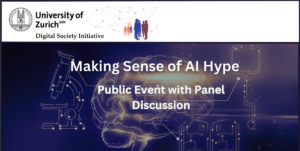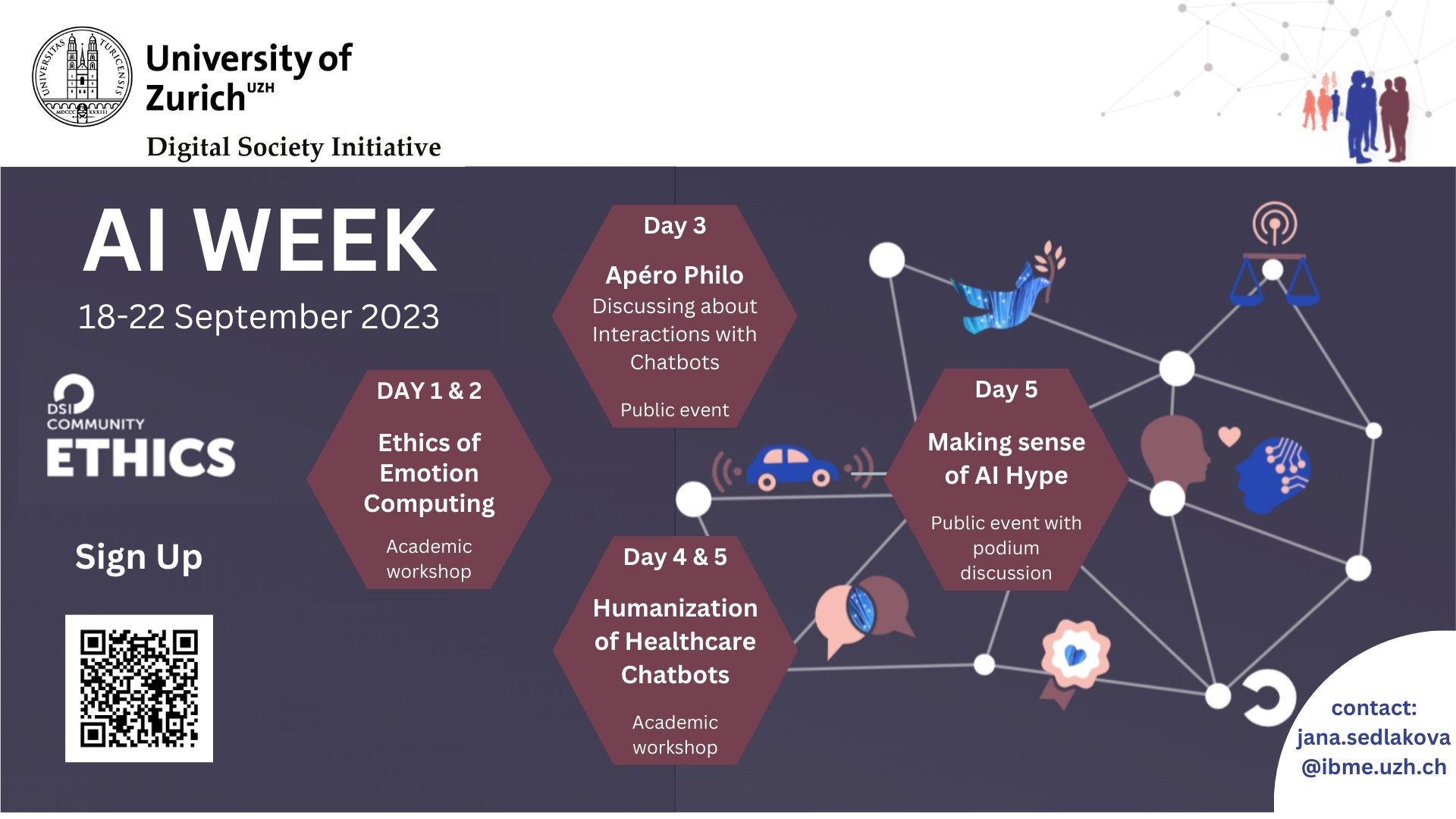DSI AI-WEEK
Researchers Involved
research areas
timeframe
2023 - 2023
contact
jana.sedlakova@ibme.uzh.chproject-files
DSI-Ethics Community organizes a series of workshops and public events to engage in current discussions about developments of Artificial Intelligence. At AI-Week, we strive to foster an environment that stimulates interdisciplinary thinking and encourages thoughtful analysis of the ethical implications inherent in AI development and applications.
This event brings together experts from various disciplines, including AI researchers, ethicists, social scientists, computer scientists, and industry pioneers. AI-Week provides a platform for networking, fostering new collaborations, and establishing connections with like-minded individuals who are passionate about shaping the future of AI in a responsible and ethical manner.
Whether you’re an AI researcher, an industry professional, an academic, or simply curious about the ethical dimensions of AI, sign up here to expand your horizons, engage in thought-provoking conversations, and help us navigate the AI terrain.
Please note that the registration is closed. If you are interested in participating online please contact directly: jana.sedlakova@ibme.uzh.ch
The AI Week consists of the following events:
Ethics of Emotion Computing
18-19 September
In-person event
Digital Library Space, Rämistr. 69, Zürich
Contact: eva.weber-guskar@ruhr-uni-bochum.de
More information here
Please note that the registration is closed. If you are interested in participating online please contact directly: jana.sedlakova@ibme.uzh.ch
Format:
Two-day academic workshop
Topic:
The aim of this workshop is to initiate a discussion among philosophy/ethics, media scientists and computer science about the underlying theoretical core concepts of emotion/affective computing as well as about emerging consequences and effects of applications of this technology in order to be finally able to properly assess the field from a normative-ethical and media-historical perspective.
Questions:
- What are the prevalent prospects and risks of applications of emotion computing from an individual and social ethical perspective and how can we navigate them?
- Do the theories of emotion which serve as the foundation for emotion computing, have any ethical implications and if so, how could and should we address these?
Speakers:
- Ana Paiva (computer science)
- Gabriele Gramelsberger (philosophy)
- Alexander Campolo (media science)
- Anna Tuschling (media science)
- Eva Weber Guskar (philosophy)
- Luke Stark (media science)
- Raphael Calvo (computer science)
Artificial intelligence and public health
19 September, 4:30 pm
Schrödinger Room, DSI, Rämistr. 69, Zürich
Organized by Population Research Center, University of Zurich
Contact: andrea.farnham@uzh.ch
More information here
Please note that the registration in person is closed. If you are interested in participating online please contact directly: jana.sedlakova@ibme.uzh.ch
Format:
1,5 h: Lecture followed by a discussion
Topic:
The role of data and analytics has never been more important in society and, in particular, for informing public health decisions. There has been a rapid change in the nature of data used in epidemiologic research and an increased focus on the use of Artificial Intelligence (AI) in the analysis of those emerging data sources. There are many conflicting points of view on the utility of AI in an epidemiologic context and a lack of clarity on the implications for the discipline and public health more generally. This talk will cover the myths, the debates, and the skepticism (from all sides) and outline a proposed direction for the role of AI in the future of public health. We will additionally cover the intersection of AI with a precision public health frame and the potential impact and unintended consequences of this framing. The talk will include implications related to bias, health equity, surveillance and causal inference. The talk will conclude by summarizing the implications for epidemiology research and training.
Speaker:
- Laura C. Rosella, PhD (Canada Research Chair in Population Health Analytics)
Moderator & Main Organizers:
- Seraina Rüegger (Center for Comparative and International Studies, ETH Zurich; Population Research Center, UZH, )
- Andrea Farnham (Epidemiology, Biostatistics and Prevention Institute, UZH, Population Research Center, UZH)
Apéro Philo
20 September, 5 – 6 pm
In-person event
Digital Library Space, Rämistr. 69, Zürich
Contact: jana.sedlakova@ibme.uzh.ch
Registration is closed.

Format:
Public event aiming at facilitating discussions in a more relaxed, friendly, and inclusive environment, which gives more space for creativity and networking.
Topic:
- What is the value of the humanization of chatbots?
- How should we treat human-like chatbots?
Speaker:
Paulina Lewandowska, expert in conversation design
Humanization of Healthcare Chatbots

21-22 September
Hybrid event
Digital Society Initiative, Rämistr. 69, Zürich; online via Zoom
Contact: jana.sedlakova@ibme.uzh.ch
More information here
Register here
Format:
Two-day academic workshop with hands-on sessions
Topic:
- How different interaction styles of chabots affect patients experience?
- How to ethically navigate the humanlikeness of healthcare chatbots?
- What is the value of simulating human properties and what are the ethical implications for individuals and society?
Speakers:
- Sven Nyholm, philosophy/ethics
- Max Kiener philosophy/ethics
- Jana Sedlakova philosophy/ethics
- Maurizio Caon, computer science
- Stefan Olaffson, computer science
- Marcia Nissen, computer science/health research
- Paulina Lewandowska, conversation designer
- Felix Gille, health policy
- Oren Asman, Amir Tal, ethics & law
Making Sense of AI Hype

22 September, 5 – 6:30 pm
Hybrid Event
Digital Society Initiative, Rämistr. 69, Zürich; online via Zoom
Contact: jana.sedlakova@ibme.uzh.ch
More information here
Register here
Format:
Public event with a podium discussion
Topic:
- How to make sense of the fast development of AI?
- How to distinguish the different AI hypes from the underlying myths
- How to navigate its ethical and societal implications?
- How can ethics and philosophy help?
Keynote by Walther Zimmerli
ARTIFICIAL INTELLIGENCE – Hype or Myth?
Since Chat GPT we are witnessing another global AI hype. In his public lecture Swiss philosopher Walther Ch. Zimmerli tries to unveil the hidden mechanism behind the undeniable success-stories of AI by reconstructing its history of recurring hype-cycles beginning with what he calls the „Dartmouth Conspiracy“ and Turing’s „rehabilitation of deception“. The underlying suggestive power of the idea of AI, however, must be attributed to its mythical character as is demonstrated both by contrasting the Gartner hype-cycle theory with the philosophy of myth (Blumenberg) and by semiotically explaining it in terms of analogies and metaphors.
Speakers:
Moderation
The project is supported by SNF Scientific Exchange Grant and Digital Society Initiative.




